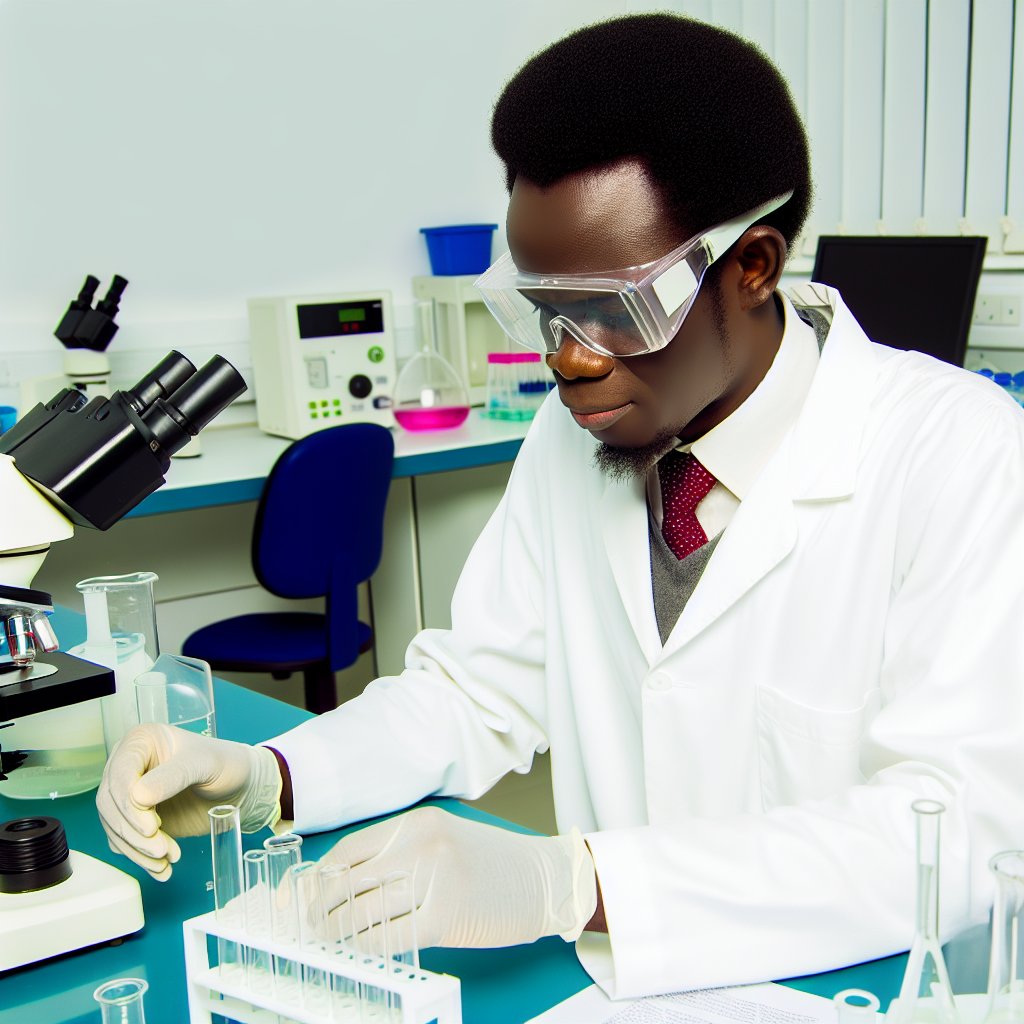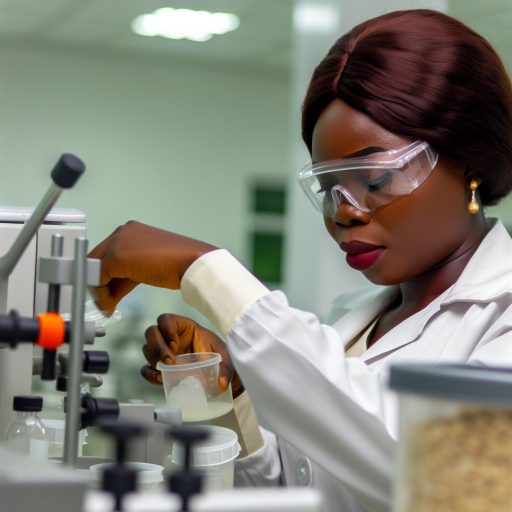Introduction:
Brief overview of the importance of medical chemistry laboratories in Nigerian institutions: Medical chemistry laboratories play a crucial role in the healthcare system of Nigerian institutions by conducting various tests, analyzing samples, and providing valuable data for medical research.
Explanation of how these laboratories contribute to medical research and advancements in healthcare: These laboratories are essential for disease diagnosis, drug development, treatment monitoring, and understanding the underlying mechanisms of various health conditions. They provide a foundation for evidence-based medicine and help in the development of new therapies and treatments.
Hands-On Experience for Students
Medical chemistry laboratories play a crucial role in training healthcare professionals.
They provide hands-on experience for students studying medicine, pharmacy, and related fields.
These laboratories serve as practical training grounds.
Students can apply theoretical knowledge to real-life scenarios.
By conducting experiments and analyzing results, students gain a deeper understanding.
This includes knowledge of chemical reactions and processes in the human body.
Medical chemistry laboratories offer students the opportunity to work with various chemicals.
Also, they use instruments and techniques commonly found in healthcare settings.
This practical experience helps students develop critical thinking skills.
Students enhance problem-solving abilities essential for future careers.
Importance of Practical Experience
Practical experience plays a vital role in helping students understand complexities.
This includes chemical reactions within the human body.
By witnessing these reactions firsthand, students can better comprehend the effects.
Different substances can have on physiological processes.
Hands-on training in medical chemistry laboratories allows students to explore alternatives.
This includes approaches to diagnosing and treating medical conditions.
This practical experience fosters creativity and innovation.
It enables students to develop new insights and solutions in healthcare practice.
Furthermore, practical experience enhances students’ laboratory skills.
These skills include proper handling of chemicals and accurate measurements.
Moreover, precise data analysis is essential for conducting research.
These skills are important for diagnosing diseases and developing treatment plans.
Overall, medical chemistry laboratories create a dynamic learning environment.
This environment simulates real-world healthcare settings.
By engaging in hands-on experiments and practical exercises, students bridge gaps.
This gap exists between theory and practice, preparing them to excel.
In this way, they prepare for their future roles as healthcare professionals.
Equipment and Resources Available in Nigerian Medical Chemistry Laboratories:
In Nigerian medical chemistry laboratories, essential equipment includes spectrophotometers, which are used for analyzing the concentration of substances.
Centrifuges are also crucial for separating components of a mixture.
Additionally, pH meters are essential for measuring the acidity or alkalinity of solutions.
Challenges in Acquiring and Maintaining Resources
One of the primary challenges faced by Nigerian institutions in acquiring and maintaining these resources is the high cost involved.
Spectrophotometers, centrifuges, and pH meters are expensive pieces of equipment, making it difficult for institutions with limited budgets to afford them.
This financial barrier hinders the ability of laboratories to operate efficiently and deliver accurate results.
Another challenge is the availability of skilled technical personnel to operate and maintain these sophisticated instruments.
Training individuals to use spectrophotometers, centrifuges, and pH meters effectively requires specialized knowledge and expertise.
However, there is a shortage of qualified personnel in Nigerian institutions, leading to inefficiencies in laboratory operations and hindering the quality of research conducted.
Furthermore, issues related to infrastructure and maintenance also contribute to the difficulties faced by Nigerian medical chemistry laboratories.
Insufficient funding for repairs and upgrades means that equipment may not be properly maintained, leading to breakdowns and decreased reliability.
Transform Your Career with Expert Guidance
Get personalized mentorship consulting that’s tailored to your unique path. Our expert advice is actionable and exclusive.
Get StartedThis, in turn, affects the overall functioning of the laboratory and hampers research activities.
In addition, logistical challenges, such as inadequate supply chains and unreliable transportation networks, make it difficult for institutions to procure essential equipment and resources in a timely manner.
Delays in acquiring needed supplies can disrupt laboratory workflows and impede research progress.
Overall, while Nigerian medical chemistry laboratories possess essential equipment such as spectrophotometers, centrifuges, and pH meters, there are significant challenges in acquiring and maintaining these resources.
Overcoming these obstacles requires strategic planning, increased investment in infrastructure and personnel training, and improved supply chain management.
By addressing these issues, Nigerian institutions can enhance the effectiveness and efficiency of their laboratories, leading to greater advancements in medical research and healthcare delivery.
Find Out More: The Pharmacist’s Role in Patient Counseling
Collaboration with Pharmaceutical Companies and Research Institutions:
Explore partnerships between medical chemistry laboratories and industry players to facilitate drug development and clinical trials.
Explain how collaborations can lead to groundbreaking research and discoveries in the field of medicine.
Collaboration between medical chemistry laboratories in Nigerian institutions with pharmaceutical companies and research institutions is crucial for advancing the field of medicine.
By forming partnerships with industry players, these laboratories can accelerate the development of new drugs and treatments while also enhancing clinical trials that could lead to innovative breakthroughs.
Benefits of Collaboration:
When medical chemistry laboratories collaborate with pharmaceutical companies and research institutions, they can combine their expertise and resources to tackle complex healthcare challenges.
By pooling together knowledge and funding, these partnerships can facilitate the translation of basic research into practical applications that benefit patients.
For example, pharmaceutical companies may provide access to their extensive libraries of compounds, allowing researchers to screen potential drug candidates more efficiently.
Facilitating Drug Development:
Collaborations between medical chemistry laboratories and pharmaceutical companies can streamline the drug development process.
By working together, researchers can identify promising drug targets, design novel compounds, and optimize their pharmacological properties.
Pharmaceutical companies bring valuable insights into the regulatory landscape and can help navigate the complex process of bringing a new drug to market.
This synergy between academia and industry is essential for accelerating the pace of drug discovery and improving patient outcomes.
Enhancing Clinical Trials:
Through collaborations with pharmaceutical companies, medical chemistry laboratories can also enhance the design and execution of clinical trials.
Industry partners can provide access to patient populations, clinical trial sites, and regulatory expertise, enabling researchers to conduct studies more effectively.
By incorporating cutting-edge technologies and methodologies, these collaborations can improve the accuracy and reliability of clinical trial data, leading to more robust conclusions and faster drug approvals.
Driving Groundbreaking Research:
Collaborations with pharmaceutical companies and research institutions can catalyze groundbreaking research in the field of medicine.
By combining diverse perspectives and resources, researchers can explore new scientific frontiers and make unexpected discoveries.
These partnerships can lead to the development of novel therapies, diagnostic tools, and preventive strategies that have the potential to revolutionize healthcare practices and improve patient outcomes.
Through collaborative efforts, medical chemistry laboratories can leverage the strengths of each partner to achieve transformative results that would not be possible through independent research.
Importance of Strategic Collaborations
Collaboration with pharmaceutical companies and research institutions is essential for advancing medical chemistry laboratories in Nigerian institutions.
By fostering partnerships that promote innovation and knowledge exchange, these laboratories can accelerate drug development, enhance clinical trials, and drive groundbreaking research that benefits patients and society as a whole.
You Might Also Like: Interdisciplinary Collaboration in Clinical Pharmacy
Quality Control and Regulation in Nigerian Medical Chemistry Laboratories
Strict quality control measures are essential for accurate testing and analysis.
These measures help to ensure the reliability and validity of results.
Quality control involves regular calibration of equipment and monitoring of procedures.
It also includes the use of standard operating protocols to maintain consistency.
Accurate analysis is crucial for proper diagnosis and treatment of patients.
Regulatory bodies play a key role in monitoring and accrediting these laboratories.
They set guidelines and standards for laboratory practices to maintain high quality.
Accreditation ensures that laboratories meet established criteria for proficiency.
Regulatory bodies conduct inspections and audits to verify compliance with standards.
They also provide oversight to prevent errors and ensure patient safety.
Accreditation is a formal recognition of the laboratory’s competence and quality standards.
It instills confidence in the accuracy and reliability of test results.
Without proper regulation, there is a risk of inaccurate diagnoses and treatment.
Regulatory bodies help to uphold the reputation and credibility of medical chemistry laboratories.
They promote public trust in the healthcare system by ensuring quality services.
Laboratories must adhere to regulatory requirements to maintain their accreditation.
Compliance with regulations is necessary for the continued operation of the laboratory.
Regular audits and assessments help to identify areas for improvement and corrective actions.
Quality control measures are part of a continuous improvement process in laboratories.
By maintaining high standards, laboratories can enhance the quality of healthcare services.
Accreditation demonstrates a commitment to excellence and patient care.
It sets the laboratory apart as a reliable and reputable institution in the healthcare industry.
Quality control and regulation are vital components of effective and efficient healthcare delivery.
Delve into the Subject: Importance of Pharmaceutics in Nigerian Healthcare

Challenges and Limitations Faced by Medical Chemistry Laboratories in Nigerian Institutions:
Funding Constraints:
Medical chemistry laboratories in Nigerian institutions often face challenges related to limited funding.
This lack of financial resources can hinder the procurement of essential equipment, reagents, and supplies necessary for conducting various tests and experiments.
As a result, the quality of laboratory services may be compromised, leading to subpar results and potential delays in patient care.
Inadequate Infrastructure:
Another major challenge faced by medical chemistry laboratories in Nigerian institutions is the inadequacy of infrastructure.
Many laboratories lack proper facilities and equipment, such as temperature-controlled storage units, fume hoods, and advanced analytical instruments.
This can impact the accuracy and reliability of test results, as well as the overall efficiency of laboratory operations.
Shortage of Trained Staff:
The shortage of trained and qualified staff is a significant limitation for medical chemistry laboratories in Nigerian institutions.
Due to limited resources and competition for skilled personnel, many laboratories struggle to attract and retain experienced professionals.
This can lead to a lack of expertise in conducting complex tests, interpreting results, and ensuring compliance with industry standards and regulations.
Suggest Possible Solutions and Strategies to Overcome These Challenges and Improve the Quality of Laboratory Services:
Increase Funding and Resource Allocation:
One key solution to address funding constraints is to advocate for increased financial support from government agencies, private donors, and international organizations.
By allocating more resources to medical chemistry laboratories, institutions can enhance their capacity to invest in state-of-the-art equipment, training programs, and research initiatives.
This would ultimately improve the quality of laboratory services and contribute to advancements in healthcare diagnostics and treatment.
Enhance Infrastructure Development:
To overcome inadequate infrastructure challenges, institutions should prioritize infrastructure development projects and renovations.
This may involve investing in modern laboratory facilities, upgrading existing equipment, and implementing sustainable maintenance practices.
By creating a conducive working environment for laboratory staff, institutions can optimize their operational efficiency, reduce downtime, and ensure the accuracy and precision of test results.
Invest in Training and Capacity Building:
To address the shortage of trained staff, institutions should focus on investing in training and capacity-building programs for laboratory personnel.
This may include organizing workshops, seminars, and certification courses to enhance the technical skills and knowledge of staff members.
By empowering employees with the necessary expertise and competencies, institutions can improve the overall performance of their laboratories, meet industry standards, and deliver high-quality services to patients.
Uncover the Details: Future Prospects for Medical Chemistry Graduates in Nigeria
Medical Chemistry Laboratories in Nigeria
Medical chemistry laboratories in Nigerian institutions are essential for conducting research and improving patient care.
These laboratories play a crucial role in advancing medical research by providing a platform for innovation and discovery.
Furthermore, they are instrumental in training future healthcare professionals by providing hands-on experience and practical skills.
The presence of well-equipped medical chemistry laboratories in Nigerian institutions is vital for the growth and development of the healthcare sector in the country.
Additional Resources
Medical Laboratory Scientist – Explore Health Care Careers – Mayo …




